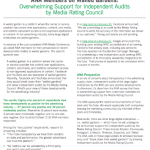The Dark Side of the Facebook and Google Ad Domination
— November 28, 2017

geralt / Pixabay
“If you want to create and capture lasting value, look to build a monopoly. . .” – Peter Thiel, PayPal co-founder and venture capitalist
In 1998, the U.S. Justice Department sued Microsoft, claiming that the company misused its power in the market by illegally linking Internet Explorer to the brand’s Windows operating system, thereby obstructing competition from Netscape.The U.S. won the case and a federal judge ruled that Microsoft needed to be broken up. Shortly after this judgment was made, a new president took office and his Justice Department settled.
Since the late 1990’s, the number of monopoly cases has plummeted. From 1970 to 1999 there was an average of nearly 16 cases per year. Between 2000 and 2014, that average dwindled down to 3.
While there is no definite line in the sand for what constitutes a monopoly in the U.S., obtaining more than a 50% market share is certainly a prerequisite. It’s not a crime to wield massive influence in the United States, but it is illegal for monopolies to obscure competition through predatory behavior.
In recent times, monopolies have reemerged as a concern in the U.S. as unprecedented mergers like that between AT&T and Time Warner make headlines. What fewer people seem concerned about, however, is the advertising duopoly created by Facebook and Google. There are a myriad reasons why we should care, however, so let’s do a deep dive.
Google and Facebook: Owners of Online Advertising
Why Google has yet to be called out as a monopoly is rather puzzling to some. Google is the world’s largest media owner, effectively controlling more than 75% of the search advertising market.
Facebook, on the other hand, controls 70% of mobile social activity; this includes properties like Instagram, Messenger, and WhatsApp.
Between the two monoliths, the companies generated 85 cents of every ad dollar spent in the first quarter of 2016. In 2016, Brian Wieser, Senior Analyst at the Pivotal Research Group, estimated that ad revenue grew by 20% over the course of 2015, reaching upwards of $ 60 billion. Nearly 65% of that money went to Google and Facebook. More recent numbers from the Interactive Advertising Bureau highlight the third quarter of 2016 as the biggest ever for online advertising, with $ 17.6 billion spent.
Jason Kint, CEO of Digital Content Next, compared the figures from 2015 and 2016 to find that Google and Facebook accounted for 99% of the growth in the third quarter. Google accounted for 54%, while Facebook made up 45%. For those who are counting, this leaves 1% of the $ 2.9 billion in growth for all other players in the adtech industry.
The control these two organizations exert over advertising and the ad-tech market has been utterly detrimental to both publishers and ad networks. This kind of overbearing authority makes it nearly impossible for alternative networks and marketplaces like Millennial Media, Kargo, and various others to compete.
Even though Facebook has been found to misreport metrics numerous times, advertisers have limited options because of the influence of these two platforms. It’s this kind of apathetic mishandling or potential falsifying of data that makes the emergence of blockchain based analytics systems a necessity in today’s world. Yes, there are solutions to our woes, but only if we wake up and use them. Through a blockchain platform, users can gain complete transparency in their advertising and attribution efforts, allowing marketers to better understand how their materials are performing.
Because of the dominance displayed by Facebook and Google, CBInsights highlighted that funding for ad-tech companies plummeted by 33% over the last year; tanking from $ 3.2 billion to $ 2.2 billion.
And while some might dispute the amount of the ad market Facebook and Google actually control, Brian Wieser poignantly remarks: “The big point is that if Google and Facebook are the primary interfaces to buyers, over the long-run they own the relationships and the related data. . . Every partner they work with is subservient.”
What this effectively does is denies competitors access to the market and enables such major corporations to exploit users – big and small – along with the economy itself. And this is something that neither Facebook nor Google seems to be above.
The Shady Activities of Google and Facebook
Back in June of this year, Google was slammed with a record $ 2.7 billion fine by the European Union for exploiting its sovereignty of the European search market. Since 2008, the company has been modifying search results to give authority to its own online shopping service over competitors.
Through the artificial alterations, it seems Google effectively denied consumers their right of choice and hampered the free market.
Facebook, on the other hand, doesn’t appear to be morally respectable either.
Days after Facebook was slapped with a $ 122 million fine by the EU for deceiving investigators about the company’s 2014 WhatsApp acquisition, the company was fined an additional $ 165,616 by French authorities for inappropriately collecting consumer data. Later that day, authorities in the Netherlands and Belgium condemned the company for how it elects to track and target users with advertising technologies.
Then, in September, Facebook faced yet another fine – this time for $ 1.4 million – from Spain for multiple counts of unlawful privacy practices. In this case, Spain accused the company of collecting data on people’s sexual proclivities, religious beliefs, ideological alliances, and other personal preferences for advertising means. These individuals, however, were unaware of what Facebook had intended to do with the information.
And this doesn’t even begin to dive into the ethical questionability of Facebook not only allowing but apparently enabling, fake Russian accounts to purchase more than $ 100,000 in Facebook ads during the 2016 election cycle.
Looking at these examples, it appears very apparent that Facebook and Google have taken advantage of global antitrust laws. These two companies have elected to repeatedly leverage their online influence in unfavorable ways. The organizations should have their practices examined and investigated to ensure no other clandestine or potentially illegal tactics are practiced, which in turn could impact global marketplaces in adverse ways.
If you’re an advertiser and you wish to live outside of Google and Facebook’s walled ad garden, or live in a world where there are more options than just these two behemoths, opt to use an alternative service and help bring power back to smaller agencies and networks.
Digital & Social Articles on Business 2 Community
(34)













